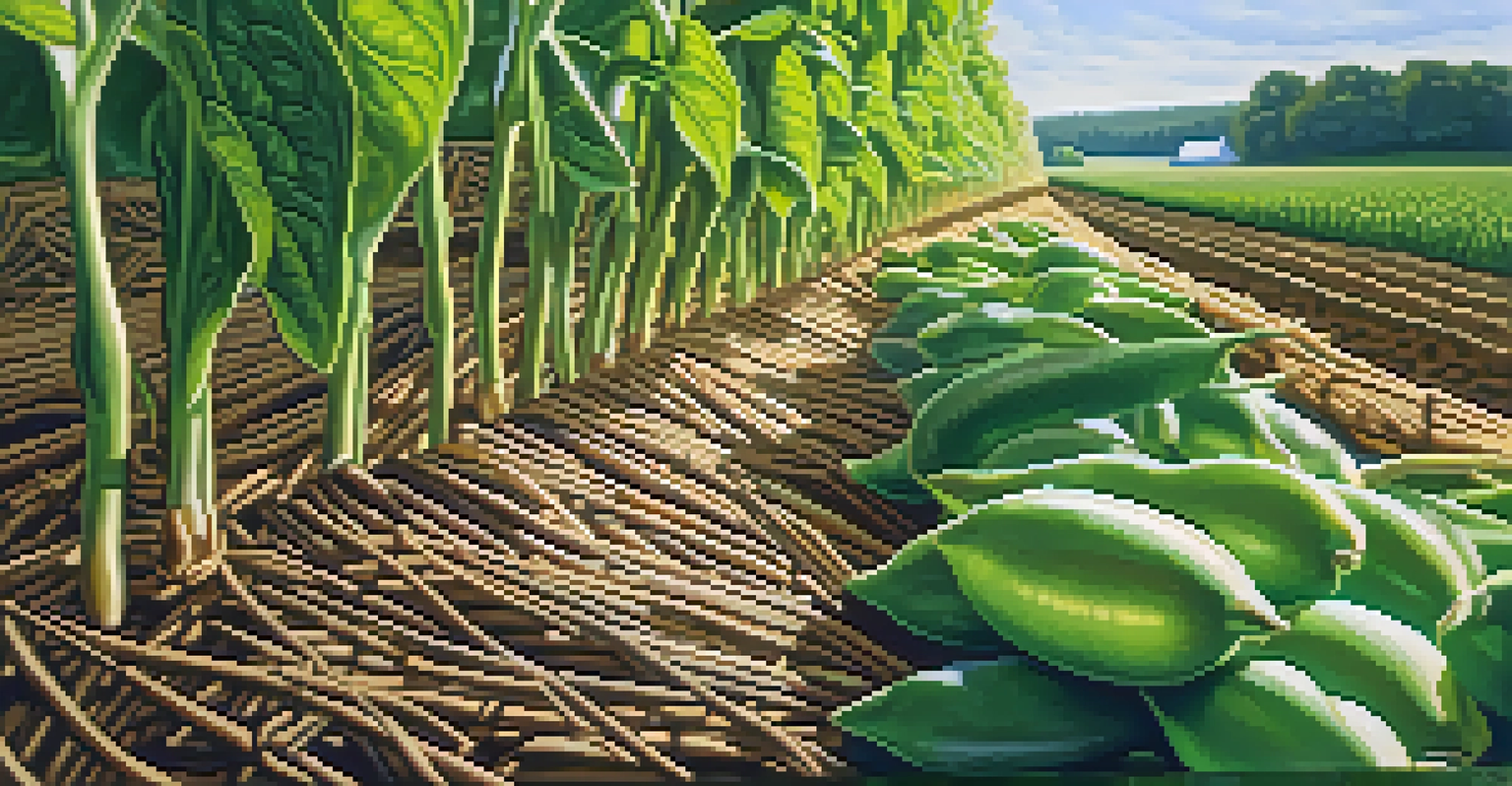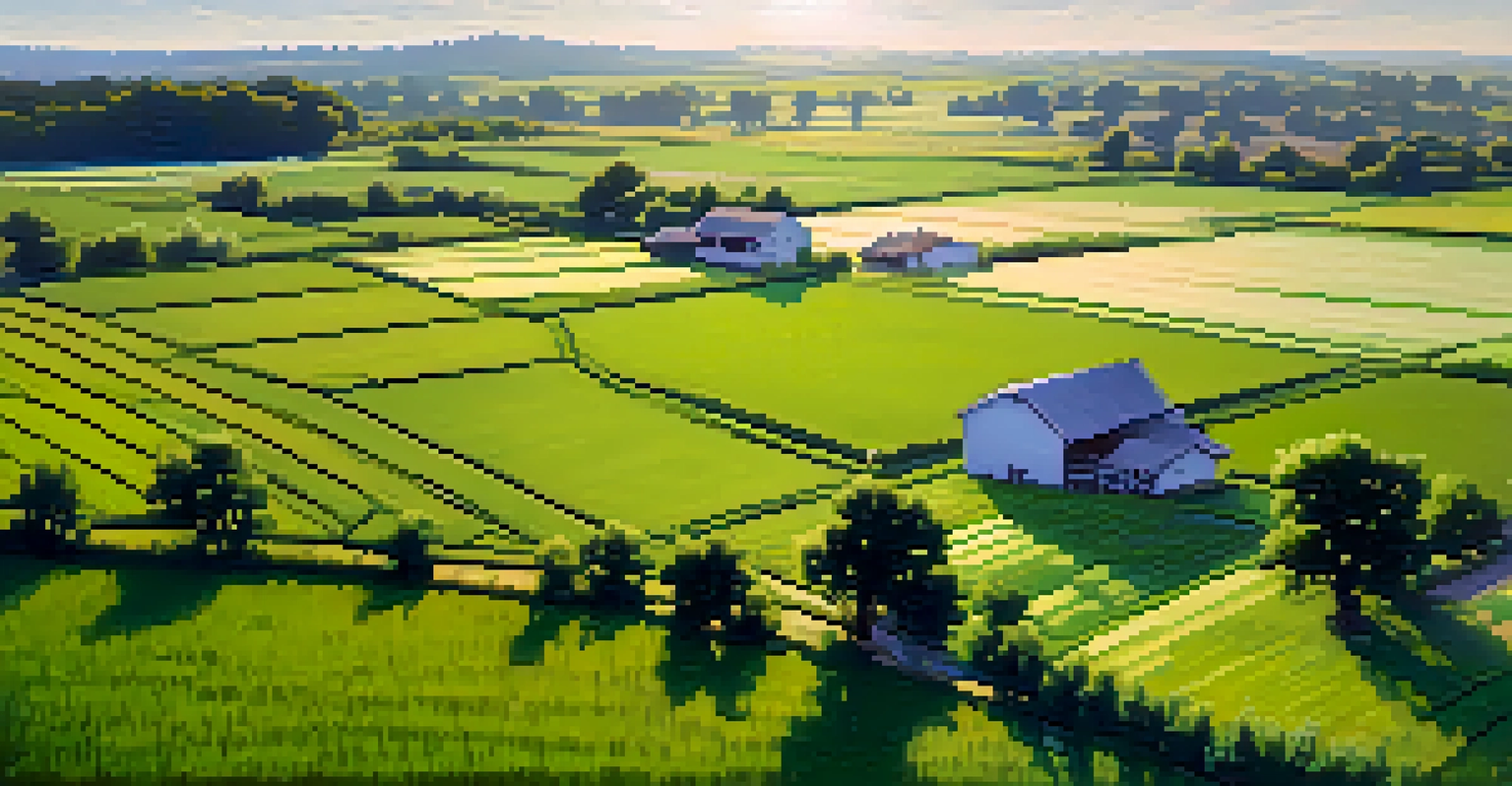Top Crops Grown in Missouri and Their Economic Significance

Understanding Missouri's Agricultural Landscape
Missouri is often referred to as the 'Show-Me State' and its agricultural landscape is a testament to that name. With its diverse climate and fertile soil, the state is a prime location for various crops, making it a significant player in the U.S. agricultural sector. Agriculture is not just a part of Missouri’s heritage; it’s a vital component of the economy, contributing billions annually.
Agriculture is the foundation of our economy and the backbone of our communities.
The state’s agricultural output is incredibly varied, ranging from grains to fruits and vegetables. Missouri ranks among the top producers of corn and soybeans, which are staples in both domestic and international markets. This diversity allows farmers to adapt to market demands and environmental changes, ensuring that Missouri remains a competitive agricultural state.
In addition to traditional crops, Missouri is also known for its specialty crops, including grapes and pumpkins. These crops contribute not only to the economy but also to local tourism, as many farms offer seasonal events and experiences. Overall, understanding Missouri's agricultural landscape gives insight into its economic significance and resilience.
Corn: The Backbone of Missouri's Agriculture
Corn is often considered the backbone of Missouri's agricultural economy. The state consistently ranks in the top ten for corn production in the United States, making it a crucial crop for both local farmers and the national economy. This versatile grain is used for livestock feed, biofuels, and various food products, highlighting its importance across multiple industries.

Farmers in Missouri have developed innovative practices to enhance corn production, such as crop rotation and advanced irrigation techniques. These methods not only increase yield but also promote sustainable farming practices. The economic impact of corn extends beyond the farm, influencing jobs in processing, transportation, and retail.
Missouri's Diverse Crop Production
Missouri plays a vital role in U.S. agriculture with its varied production of staples like corn and soybeans, as well as specialty crops.
Moreover, the success of the corn industry supports rural communities throughout Missouri. Local businesses thrive on the demand for supplies, equipment, and services related to corn farming. As such, corn production truly embodies the interconnectedness of agriculture and the economy in Missouri.
Soybeans: A Vital Component of Missouri's Economy
Soybeans are another cornerstone of Missouri's agricultural output, frequently ranking alongside corn in terms of importance. As a high-protein crop, soybeans are not only essential for livestock feed but also serve as a key ingredient in various food products and industrial applications. This multi-use nature makes soybeans a valuable asset for farmers and the economy alike.
Farming is not just a job; it's a way of life, deeply intertwined with our culture and economy.
Missouri's farmers have embraced modern techniques to maximize soybean production, resulting in higher yields and better quality crops. The state is particularly known for its contributions to the global soybean market, exporting a significant portion of its harvest. This international demand has bolstered Missouri's economy, creating jobs and opportunities in agriculture-related sectors.
Additionally, the soybean industry plays a crucial role in supporting local communities. From the equipment used in farming to the processing facilities that turn soybeans into consumer products, the economic ripple effect is substantial. Thus, soybeans not only sustain farmers but also enhance the overall economic landscape of Missouri.
Wheat: A Staple Crop with Global Reach
Wheat is another important crop in Missouri, contributing to both state and global food security. Missouri's climate is conducive to growing several wheat varieties, including hard red winter wheat, which is prized for its baking qualities. This makes wheat a staple crop that is essential for producing bread, pasta, and other food items.
Farmers in Missouri have adopted advanced agricultural practices to improve wheat yields and quality. This includes precision agriculture, which utilizes technology to monitor crop health and optimize resource use. The ability to produce high-quality wheat not only supports local markets but also enhances Missouri's competitiveness in international trade.
Technology Enhances Farming Efficiency
Modern technology, including GPS and data analytics, has transformed farming practices in Missouri, boosting productivity and sustainability.
The wheat industry also provides numerous economic benefits to Missouri. From transportation to milling and baking, many jobs are linked to wheat production. As such, wheat is not just a crop; it’s a vital element of the state’s economic infrastructure and food supply chain.
Rice: A Unique Crop in Missouri's Agriculture
While not as widely recognized as corn or soybeans, rice is a unique and significant crop in Missouri, particularly in the southeastern region. Missouri is one of the few states in the U.S. that cultivates rice, making it an important player in the specialty crop market. This agricultural diversification helps enhance the state's economic resilience.
The production of rice provides a valuable alternative crop for farmers, especially those looking to diversify their planting options. With the right conditions, rice farming can be highly lucrative, offering farmers a chance to tap into both domestic and international markets. Missouri rice is often sought after for its quality, further strengthening its market position.
Moreover, rice farming contributes to the local economy in various ways, including job creation in processing and distribution. Events that celebrate rice production also foster community engagement and tourism. As a result, rice is not just an agricultural product; it’s a significant part of Missouri’s cultural and economic fabric.
Specialty Crops: Boosting Missouri's Agricultural Diversity
In addition to staple crops, Missouri's agricultural landscape boasts a variety of specialty crops, including fruits, vegetables, and herbs. These crops not only enhance the diversity of Missouri’s farming operations but also cater to a growing demand for locally sourced produce. Specialty crops can be a lucrative venture for farmers, especially those who sell directly to consumers through farmers' markets.
The rise in popularity of farm-to-table dining and organic produce has given specialty crops a notable boost. Farmers are increasingly experimenting with unique varieties to attract consumers, which in turn has led to the growth of niche markets. This trend creates opportunities for small-scale farmers to thrive and contribute to the local economy.
Future Trends in Sustainable Agriculture
Missouri's agriculture is evolving with trends such as sustainable farming and agritourism, ensuring its relevance in a changing market.
Additionally, specialty crops play an essential role in Missouri's tourism sector. Many farms offer tours, pick-your-own experiences, and seasonal festivals that draw visitors from near and far. This not only promotes local agriculture but also supports other businesses in the area, creating a vibrant economic cycle.
The Role of Technology in Modern Farming
Technology has transformed the agricultural landscape in Missouri, leading to increased efficiency and productivity. From GPS-guided tractors to drones that monitor crop health, modern farming techniques allow farmers to maximize their yields while minimizing waste. This technological evolution is essential for meeting the demands of a growing population and a competitive market.
Farmers are now equipped with data analytics tools that help them make informed decisions about planting, irrigation, and pest management. This not only enhances crop quality but also promotes sustainable practices that benefit the environment. As Missouri farmers adopt these advancements, they position themselves as leaders in the agricultural sector.

Furthermore, technology’s impact extends beyond the farm. It influences supply chains, marketing strategies, and consumer engagement, making it a crucial element of Missouri's agricultural economy. The integration of technology ensures that Missouri's agriculture remains robust and capable of adapting to future challenges.
Future Trends in Missouri Agriculture
Looking ahead, Missouri's agricultural landscape is poised for exciting developments. Trends such as sustainable farming, organic produce, and precision agriculture are gaining traction among farmers. These practices not only help protect the environment but also cater to the evolving preferences of consumers who are increasingly mindful of their food choices.
The state is also witnessing growth in agritourism, where farms open their doors to the public for educational and recreational activities. This trend not only diversifies income for farmers but also strengthens community ties and promotes local agriculture. As more people seek authentic experiences, agritourism is likely to continue expanding.
Finally, ongoing research and development will play a crucial role in shaping the future of Missouri agriculture. Innovations in crop breeding, pest management, and soil health can lead to improved resilience against climate change and market fluctuations. By embracing these trends, Missouri's agricultural sector can ensure its continued significance in the economy for years to come.